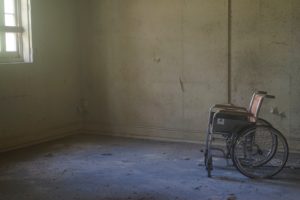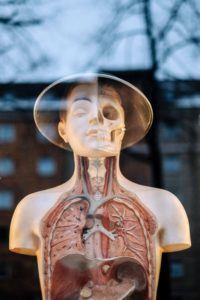The Humble Body
The pool where I work is part of a rehabilitation center, which is part of a local hospital. There are actually two pools. One is a lap pool of about 84 degrees. The other is a large therapy pool, nearly as big as the 4-lane lap pool. The therapy pool is about 94 degrees. The pool patrons are a mix of the public, hospital staff and rehab patients.
As a lifeguard, I spend hours in an elevated chair watching people in the water and moving around on the deck. It delights me to be paid for doing what I naturally do in the world, which is to people watch. In an environment with a consistent air temperature over 80 degrees with more than 50% humidity, all of us — staff, patrons and patients — are necessarily without our usual armor of clothing, make-up and jewelry. We are physically revealed to one another to an unusual degree in a public place.
I’m struck every day by the humility of flesh, the wonder and complexity of our physical being; the almost painful innocence of small children with their rounded, unselfconscious forms; the incredible and paradoxical endurance, resilience and fragility of the human body, and the inexorable truths our unconcealed bodies reveal.
I’m touched by the everyday, patient, humble courage of people whose bodies are ill, injured and aging. I watch people participate in classes: Water walking, water aerobics, arthritis and fibromyalgia in the therapy pool, and swim lessons. I watch couples and families, caregivers and their charges, school groups and special needs groups. People come to lose weight, to rehabilitate after a stroke or cardiac event, to increase their strength and endurance, to recover from surgery or injury. People also come to socialize, to play, and to be inspired and motivated by staff, classes, music and one another.
Some folks swim laps. Others water walk and go through exercise routines with buoys, kickboards and weights. They come out of the locker rooms with walkers, canes and wheelchairs. Some need help getting in and out of the pool, or even down to the pool from the parking lot.
For the most part, people who make use of the facility are patient, pleasant and good-natured. Watching them, I wonder at their resilience. What must it be like to be so bent one can only see the floor? How does one cope when the only ambulation possible is to creep along with a walker? The joy and laughter of a wheel-chair bound young person with contorted and twisted limbs like sticks when she’s carried into the therapy pool make me weep.
There’s really no place to hide in the world, at least from ourselves. We all live in a body, and many of us struggle with loving them, including me. We spend an amazing amount of time, money, anguish and effort in disguising our perceived physical defects from the eyes of the world. We tell ourselves nobody can see our shame. No one can see how unlovely or imperfect we really are. No one will ever know.
But we know, and our shame and self-loathing poison our lives.
I wonder, as I sit in the chair, what is it about the people who use the pool that enables them to risk physical authenticity? Do they love and accept themselves as they are? If so, how have they developed that ability? Are they unconcerned with what others think of them? Are they like me, and simply resigned to their physical reality, feeling the benefits of using the pool are more important than hiding their appearance, but privately ashamed and embarrassed?
In thinking about this, I realize my own relationship with my body is complicated. On the one hand, I feel affection, loyalty and gratitude. I’ve never aspired to beauty, whatever beauty is. On the other hand, I cringe every time I see a picture of myself, which is not often, as I hate having my picture taken and avoid it whenever possible. I think I cringe because I wish I could protect that vulnerable woman from the eyes and criticism of others. I cringe because my deepest and most private shame is that my physical envelope contains some hidden foulness that makes me unworthy of physical affection and contact. I’m not talking about sex. Sexual attraction and desire are a whole different conversation. I’ve been good enough for sex, but not good enough for consistent loving, nurturing touch. Not good enough to hold.
In fact, one of the biggest reasons why I love the water so much is that it touches me.
The shame I feel around this is corrosive and chronic. It’s my intention that it also remain entirely invisible to any onlooker. The pain of this hidden vulnerability of mine enlarges the way I observe others in their bodies. It seems to me we must all have some degree of skin hunger that’s more or less satisfied, depending on our situation. We must all feel some degree of physical isolation and alienation at some point in our lives. Surely every body I see is worthy of care, of love, of touch and nurture, in spite of skin tags, scars, cellulite, bulges and sags, hair distribution or absence, aging, injury and disability, too many or too few pounds.
As I sit on the lifeguard stand, counting heads and scanning the pools, I keep coming back to courage. Courage and humility. The willingness to be seen without the comfort and concealment of clothing. The willingness to be physically authentic and vulnerable. Not a story of courage that will ever be made into a movie, but a kind of daily, humble heroism that touches and inspires me.
As an observer, it’s effortful to discard childish judgements like “ugly” and “beautiful.” It’s hard not to apply an internalized rating system. I’m tainted by Hollywood, by digitally altered images and by my own private romantic fantasies. Somewhere underneath all the limitations imposed by that conditioning and brainwashing, I glimpse a vast compassionate wisdom encompassing all of us. Life, after all, is beautiful and miraculous. Doing what we can to care for and accept the body we have is an act of courage and strength. Allowing ourselves to be seen and vulnerable takes humility and heroism.
I wonder, somewhat uneasily, if we are no longer able to grasp the beauty inherent in our physical forms. We seem determined to approach the planet’s body, our own and the bodies of others as commodities and resources to plunder, manipulate and then discard when they become boring, worn-out, ill or (at least to our eyes) ugly. Perhaps we’ve lost the ability to appreciate and value everybody in every unique, individual body. Maybe our culture is so injured all we can do now is hate, judge and criticize not only ourselves but others.
Perhaps we’re determined to tear ourselves apart and nothing will stop us.
In the meantime, however, I live in a body, just as you do, and we all have a deeply private and largely invisible relationship with our structure of flesh, blood and bone. My choice is to remain present with the wonder and complexity of the human body, yours, mine and theirs. My choice is to enlarge my compassion and observation until I touch that edge of wisdom that acknowledges beauty and worth in all of physical life, be it human, tree or creature.
All content on this site ©2018
Jennifer Rose
except where otherwise noted




